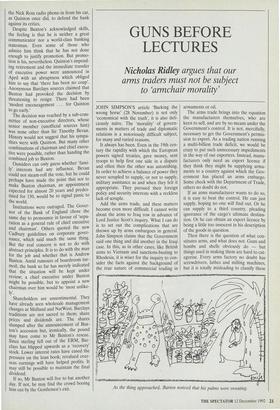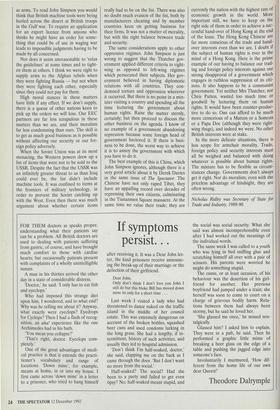GUNS BEFORE LECTURES
Nicholas Ridley argues that our arms traders must not be subject to 'armchair morality'
JOHN SIMPSON'S article 'Backing the wrong horse' (28 November) is not only `economical with the truth', it is also deli- ciously naïve. The 'morality' of govern- ments in matters of trade and diplomatic relations is a notoriously difficult subject, for many and varied reasons.
It always has been. Even in the 19th cen- tury the rapidity with which the European powers signed treaties, gave money, sent troops to help first one side in a dispute and often then the other was astonishing. In order to achieve a balance of power they never scrupled to supply, or not to supply, military assistance as and when they felt it appropriate. They pursued their foreign policy and security interests with a reckless lack of scruple.
Add the arms trade, and these matters become even more difficult. I cannot write about the arms to Iraq row in advance of Lord Justice Scott's inquiry. What I can do is to set out the complications that are thrown up by arms embargoes in general. John Simpson claims that the Government said one thing and did another in the Iraqi case. In this, as in other cases, like British arms to Vietnam and sanctions-busting to Rhodesia, it is wiser for the inquiry to con- sider the facts against the background of the true nature of commercial trading in armaments or oil.
The arms trade brings into the equation the manufacturers themselves, who are keen to sell, and are by no means under the Government's control. It is not, mercifully, necessary to get the Government's permis- sion to export. As a trading nation running a multi-billion trade deficit, we would be crazy to put such unnecessary impediments in the way of our exporters. Instead, manu- facturers only need an export licence if they think they might be supplying arma- ments to a country against which the Gov- ernment has placed an arms embargo. Some check with the Department of Trade, others no doubt do not.
If an arms manufacturer wants to do so, it is easy to beat the control. He can just supply, hoping no one will find out. Or he can supply to a third country, pleading ignorance of the cargo's ultimate destina- tion. Or he can obtain an export licence by being a little too innocent in his description of the goods in question.
Then there is the question of what con- stitutes arms, and what does not. Guns and bombs and shells obviously do — but things used in making them are hard to cat- egorise. Every arms factory no doubt has screwdrivers, lathes and milling machines, but it is totally misleading to classify these
As the thing approached, Barton noticed that his palms were sweating. as arms. To read John Simpson you would think that British machine tools were being hurled across the desert at British troops in the Gulf war. To require an application for an export licence from anyone who thinks he might have an order for some- thing that could be of use in waging war leads to impossible judgments having to be made by all concerned.
Nor does it seem unreasonable to 'relax the guidelines' at some times and to tight- en them at others. I think we were right to supply arms to the Afghan rebels when they were fighting Russia — but not when they were fighting each other, especially since they could not pay for them.
High moral stances in these matters have little if any effect. If we don't supply, there is a queue of other nations keen to pick up the orders we will lose. Our EEC partners are far less scrupulous in these matters than we are, and their moralists far less condemning than ours. The skill is to get as much good business as is possible without affecting our security or our for- eign policy adversely.
When the Soviet Union was at its most menacing, the Western powers drew up a list of items that were not to be sold to the USSR. Despite the fact that the USSR was an infinitely greater threat to us than Iraq could ever be, the list didn't include machine tools. It was confined to items at the frontiers of military technology, in order to prevent the Soviet catching up with the West. Even then there was much argument about whether certain items really had to be on the list. There was also no doubt much evasion of the list, both by manufacturers cheating and by member countries keen on getting business for their firms. It was not a matter of morality, but with the right balance between trade and security.
The same considerations apply to other oppressive regimes. John Simpson is just wrong to suggest that the Thatcher gov- ernment applied different criteria to right- wing as opposed to left-wing regimes which persecuted their subjects. Her gov- ernment believed in having diplomatic relations with all countries. They con- demned torture and oppression wherever it occurred. But there is no point in a min- ister visiting a country and spending all the time lecturing the government about human rights. Raise the matter sternly, certainly; but then proceed to discuss the other business on the agenda. I know of no example of a government abandoning repression because some foreign head of government hectored it. If there is busi- ness to be done, the worst way to achieve it is to annoy the government with which you have to do it.
The best example of this is China, which John Simpson ignores, although there is a very good article about it by Derek Davies in the same issue of The Spectator. The Chinese have not only raped Tibet, they have an appalling record over decades of repressing their own citizens, culminating in the Tiananmen Square massacre. At the same time we value their trade; they are currently the nation with the highest rate of economic growth in the world. More important still, we have to keep on the right side of them in order to achieve a suc- cessful hand-over of Hong Kong at the end of the lease. The Hong Kong Chinese are far more conscious of the trade and hand- over interests even than we are. I doubt if the subject of human rights is ever in the mind of a Hong Kong. Here is the prime example of our having to balance our trad- ing and foreign policy interests against our strong disapproval of a government which engages in ruthless suppression of its citi- zens. It also happens to be a communist government. Yet neither Mrs Thatcher, nor Chris Patten, wasted too much time or goodwill by lecturing them on human rights. It would have been counter-produc- tive to do so. One can afford to be much more censorious of a Marcos or a Somoza or a Papa Doc (although they were right- wing thugs), and indeed we were. No other British interests were at stake.
In the more delicate situations, there is less scope for armchair morality. Trade, foreign policy and security interests must all be weighed and balanced with doing whatever is possible about human rights. The mixture has to be flexible as circum- stances change. Governments don't always get it right. Nor do moralists; even with the priceless advantage of hindsight, they are often wrong.
Nicholas Ridley was Secretary of State for Trade and Industry, 1989-90.



































































 Previous page
Previous page